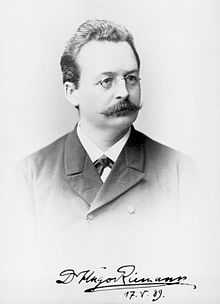Hugo Riemann

Karl Wilhelm Julius Hugo Riemann (July 18, 1849 – July 10, 1919) was a German music theorist and composer.
Biography
Riemann was born at Grossmehlra, Schwarzburg-Sondershausen. He was educated in theory by Frankenberger, studied the piano with Barthel and Ratzenberger, studied law, and finally philosophy and history at Berlin and Tübingen. After going through the Franco-German war he decided to devote his life to music, and studied accordingly at the Leipzig Conservatory. He then went to Bielefeld for some years as a teacher and conductor, but in 1878 returned to Leipzig as Privatdozent at the University.
As a much-desired appointment at the Conservatory did not materialize, Riemann went to Bromberg in 1880, but 1881–90 he was a teacher of piano and theory at Hamburg Conservatory. After a short time at the Sondershausen Conservatory, he held a post in the conservatory at Wiesbaden (1890–95), but eventually returned to Leipzig University as lecturer in 1895. In 1901, he was appointed professor.
Writings
In addition to his work as a teacher, lecturer and composer of pedagogical pieces, Riemann had a worldwide reputation as a writer on musical subjects. His best known works are Musik-Lexikon (1882; 5th ed. 1899; Eng. trans., 1893–96), a complete dictionary of music and musicians, the Handbuch der Harmonielehre, a work on the study of harmony, and the Lehrbuch des Contrapunkts, a similar work on counterpoint, all of which have been translated into English. One of his inventions, the Tonnetz, is the predecessor of the modern idea of pitch spaces, and is a fundamental analytical tool of the current field of neo-Riemannian theory.
He authored many works on many different branches of music. His pupils included the German composer, pianist, organist, and conductor Max Reger, and the musicologist and composer Walter Niemann.
Compositions
He wrote many pieces for piano, songs, a piano sonata, six sonatinas, a violin sonata, and a string quartet.
See also
- Riemannian theory
- Neo-Riemannian theory
- Chordal space
- Modulatory space
- Functional harmony
- Counter parallel
References
- Alexander Rehding: Hugo Riemann and the birth of modern musical thought. Cambridge: Cambridge University Press, 2003. ISBN 0-521-82073-1
-
 "Riemann, Hugo". New International Encyclopedia. 1905.
"Riemann, Hugo". New International Encyclopedia. 1905.
External links
![]() This article incorporates text from a publication that prior to 1923, is in the public domain: The Etude (Philadelphia: Theodore Presser Company)
This article incorporates text from a publication that prior to 1923, is in the public domain: The Etude (Philadelphia: Theodore Presser Company)
| ||||||||||
|